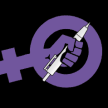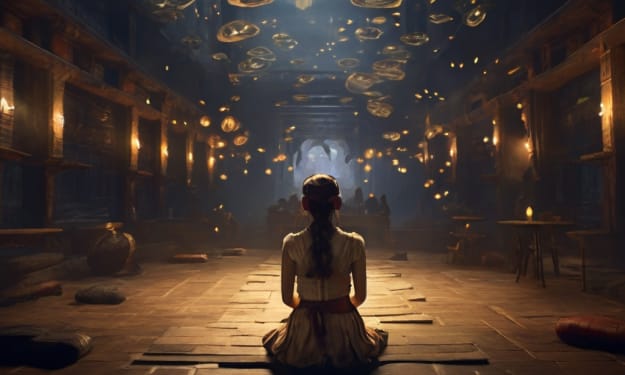A Female Perspective on "Ellie"
The Ups and Downs of Being a Girl in the Online Gaming World

In the wake of the recent Overwatch Contenders scandal/bullshit, I just want to talk about some of my experiences with online gaming as a female. Maybe this way, no one else will feel compelled to conduct a "social experiment" that could potentially set women-in-professional-gaming back years.
Some background: A player by the name of "Ellie" began rising rapidly through the ranks of competitive Overwatch, catching the attention of a Contenders team (think minor league for Overwatch professional esports) that badly needed a substitute player. A lot of people were excited to see another girl make it to the big leagues, especially one as skilled as Ellie seemed to be. Keeping in mind that the only female player in the entire Overwatch League (the major leagues) is Se-yeon "Geguri" Kim, this was big news. As a female player myself, highly invested in the Overwatch League, and a raging feminist to boot, I was over the moon to see more female talent given a chance to shine.
And then came the questions. Who was Ellie? Where had she come from? Was she actually the one playing?
Now, any player that's insanely good is going to be accused of hacking somewhere down the line. Usually by the enemy team. And a lot of people have already made the argument that since they were right (spoilers), and Ellie turned out to be a fraud—they were completely justified in these questions. But it's always different when there's a woman in the mix. According to the Contender's team owner, Justin Hughes, while many saw Ellie as a "symbol of empowerment," on the other side "we had people questioning her legitimacy, issuing threats, etc." Multiple sources have referred to the wave of accusations as harassment and reported doxxing threats, which is never okay, and happens to women disproportionately.
The funny thing is, Geguri was also accused of hacking/trickery when she first came on the scene. An excellent moment in the history of female professional gaming—when she proved that she wasn't, her accusers quit their teams and professional Overwatch entirely.
Ellie, unfortunately, would not hold up to the same scrutiny.
'Ellie' was actually a top 500 player "Punisherow," who had previously stated on streams that he was Ellie's boyfriend. The accusations were true.
It was a deep blow to the female gaming community. Punisherow called it a "social experiment," and the results are very interesting. And completely stupid, as a lot of women have already pointed out on Twitter.
Being a girl in the world of online gaming is no picnic, as any woman who's ever put her fingers on a keyboard or a controller can tell you. I've praised Overwatch in the past for it's diversity, racially and gender-wise. It has a fairly even ratio of female-to-male characters, and it's refreshing to see female characters as Tanks and DPS, in addition to their usual Support role. I've met more women playing Overwatch than I have in any other game I've ever played.
That doesn't mean it's perfect. Not solely fault of Blizzard or the Overwatch League/Contenders (though certainly there's things they could do differently or better)—the culture of video games has always been predominately male-oriented. The one class I took in college that had more men than women was "Video Game Analysis." There were three of us at the beginning of the semester, and one girl dropped out a few weeks in. When we finally got to the dreaded day of "Gender and Gaming," I was appalled by the reading, the professor, and several of my fellow students.
The chapter we read to prepare for the discussion stated, with no uncertainty, that The Sims was the best game for women, because it allowed them to focus on relationships and running a household. Thank you, 1950s, but the women I play with want to kill things just as much as the men I play with. When I raised this point, along with the sordid history of objectification of women in video games, one of my fellow students looked me straight in the eye and said "Who cares if women are objectified in video games? That's what men want to see." The professor refused to allow me to rebut this remark, nor would not allow me to leave. But later that night, sent me a very condescending email asking if I was "feeling okay," after that discussion. As if I had been too sensitive while fending off roughly two-thirds of my classroom's misogyny, as if I were the problem. I was not okay. I was angry, and justifiably so.
Back then, I played World of Warcraft. My name was not obviously female, but when I revealed myself to be or entered a voice chat, I got the usual— an unpleasant mix of people wanting to be my "online boyfriend," despite the fact that I was usually grouped with my fiance at the time, jokes about PMSing when I was frustrated, and harassment about my ability to play. Because identifying as a women must automatically make me worse at video games.
When I switched to Overwatch, the atmosphere was different in the beginning. And then I began playing ranked, and communicating is important, meaning more voice chat. I endured jokes about domestic violence, rape, periods, and anything else certain individuals could think of to try and get under my skin. But these occasions were still rare enough that I could mostly shake it off.
Mostly.
On a good day, my response to "jokes" like this was to say "slightly uncomfortable," and that was enough to make the other members of my team cool it. Once I even got a very heartfelt apology, which I accepted. On a bad day, it made the situation worse.
One fateful night, I joined a group with the most misogynistic people I've ever had the misfortune of playing a game with. I was quiet for a round, and then I asked politely for everyone to focus on the game instead. Which made me the target of their harassment. I quit the match, deciding that losing 50SR wasn't worth my sanity, and I figured it would end there. It did not. This group followed me from match to match, harassing me in voice chat, and match chat when they were on the opposite team. They sent me private messages until I had no choice but to block them. It was such a frustrating experience that I ended up changing my battle tag, since reporting them seemed to come to no fruition.
I chose "JessicaJones" as my new tag, because I was tired of hiding the fact that I was a woman, and a woman who believed in equality and empowerment. "Do no harm and take no shit," became my new motto. And it worked. I was more firm when the conversation drifted towards abusing women, and I used the report and block buttons liberally for people who couldn't accept that.
Not too long after, I found a group of men who welcomed me into their discord server, their conversations and their jokes, and while there were still some uncouth banter, I rolled with it. If they went too far, I told them, and because they were my friends, they didn't often cross the line. Two of them are now some of my very best friends, despite the fact that we live in different states and countries.
These two men are incredibly respectful of my beliefs. They still make their jokes, but they tend to do that when I'm not around. We also have a non-binary friend on our server, and they're careful to use their chosen pronouns. We've had excellent discussions about women and feminism, particularly in regards to the games we love, and some of their favorite characters are female. I know that they respect me, and overall, women. When I told them about the Ellie fiasco, they were just as enraged as I was, sympathetic enough to let me rant about it, and offering their own disappointment as well. They don't talk over me, and they listen when I talk. They respect my abilities as a gamer, though none of us are close to professional. And it's made the gaming experience so much more enjoyable.
So this article is not only to express my outrage and disappointment about this situation, it's to thank these two men. For standing beside me, for being true allies, for allowing me a space in a male-predominated world and never making me feel lesser for not being a male.
This is the experience of playing online games as a person who identifies as anything other than male. Deep, dark pits, the low points and bad nights that will make you grateful for mute buttons and reporting systems—and the soaring highs when you find people who aren't total jerks. In the end, games are supposed to be fun, but all too often for those who identify as female (or non-binary), they become a gauntlet. You never know what kind of team you're going to wind up with on Overwatch. The ones that start cackling and howling "Is that a girl gamer?!" the second you open your mic, or the ones that say "Hey, let's run this strat," and stay focused on having fun and playing well.
Harassment is a complicated subject, and it's different for everyone. By no means is it solely a female-problem, my foreign friend gets harassed for his accent, and anyone can become a target for a frustrated enough individual. But there's no denying that this happens to women disproportionately, just check Twitter or ask the female gamers in your life. I guarantee you, they'll have stories just like mine. You don't need to run a 'social experiment' to find out what it's like. And by doing this, Punisherow has made it that much harder for the next genuine female who tries to go pro.
Because that's the difference. What happens to one woman, happens to all of us. If a male has a bad match or is caught cheating, it affects that player. When it happens to a female player, or someone pretending to be, it casts doubt on all of us. The culture is already hard enough to break into. Between a long history of misogyny, the fact that it's more socially acceptable/expected for men to play video games than it is women, and the pressures of having to prove you can "hang with the boys," it can be a daunting task.
Overwatch is still one of my favorite games to play. The community can be challenging at times (and that's being generous), but the joy I have playing with my friends makes it worth it. Even if I still do occasionally run into people who doubt my skills just because of my voice.
All it takes is one person to ruin a match. But all it takes is one other person to turn it around.
Next time you log onto your game of choice, ask yourself which kind of person you want to be. And if you or one of your friends decides to emulate Punisherow's "social experiment," just... don't.
About the Creator
Tarin Campanella
Writer. Feminist. Sustainabilibuddy. Fight me.






Comments
There are no comments for this story
Be the first to respond and start the conversation.